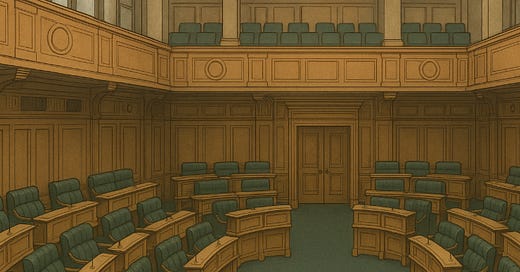Enough of the Games, Enough of the Indulgence
If the House won’t stand up for itself, it only invites further contempt.
In a political community, order is not the enemy of freedom. It is the condition of freedom. Protest may be spirited and dissent vocal, but only within the bounds of a shared understanding of reciprocity and acceptance that others are not required to listen.
The ongoing conduct of Te Pāti Māori in Parliament continues to reject that understanding. What began as a theatrical interjection during debate in the form of protest haka has become something far more serious than the initial disruption.
What we have now is one party engaging in a sustained repudiation of the ordinary disciplines by which the House of Representatives governs itself.
Called to account, the members declined to answer in accordance with those disciplines. Instead, they issued demands, dismissed the properly constituted processes of Parliament as a kangaroo court, and retreated, as is their pattern, into performance.
When that performance failed to provoke the desired change in procedure, the party violated the confidence of the committee by publishing a confidential draft report. Having done so, its leaders issued an apology that sought to downplay their own responsibility, essentially blaming staff.
This is not merely incivility. It is not just poor judgment or exuberance. It is a studied rejection of the disciplines that make collective deliberation possible. Parliament is not a theatre, even if some theatre is expected.
It is a place where the difficult business of self-government is transacted, slowly and by mutual concession, through the language of procedure and the rhythm of debate. That is its dignity.
As I have written before, there are sanctions available to the House: suspension, censure, and fine. These have their place. But when deployed against those who seek to convert every consequence into another act in a long-running political monologue, such measures risk becoming part of the performance.
What is needed now is something different—not more severe, but more meaningful.
It would be entirely proper for the House to consider suspending Standing Order 77(2), and with it, Te Pāti Māori’s participation in the Business Committee for some period of time.
The Business Committee is one of Parliament’s most important but least understood bodies. It is where the daily operation of the House is negotiated, including sitting hours, speaking times, and the scheduling of business. Unlike the combative atmosphere of the debating chamber, the Business Committee relies on consensus, trust, and cooperation among parties. To participate in it is not merely a procedural entitlement but a recognition that a party is willing to engage in the shared task of keeping Parliament functioning.
To sit on that committee presupposes a certain acceptance of the rules of engagement.
Keep reading with a 7-day free trial
Subscribe to The Blue Review w/ Liam Hehir to keep reading this post and get 7 days of free access to the full post archives.





